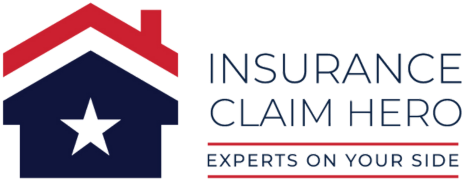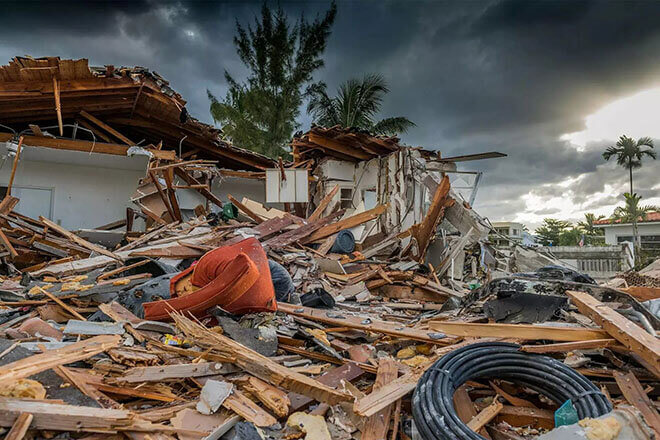Has a hurricane just hit your area? Don’t worry – you’re not alone. This guide will walk you through exactly what to do next, from staying safe to getting money from your insurance company.
Step 1: Stay Safe After the Hurricane
Before anything else, safety comes first! Here’s what everyone needs to check:
Safety Checklist
- Don’t go home until officials say it’s OK- Local emergency teams need to check for dangers like gas leaks and unsafe buildings before anyone returns. Stay updated through official channels and only return when authorities confirm your area is safe for residents. This waiting period helps emergency crews work faster and keeps you protected from hidden dangers.
- Watch out for fallen electric lines- Fallen power lines can energize flood waters, metal fences, and the ground around them, creating invisible danger zones. Stay at least 30 feet away from any downed lines and report them immediately to your power company or local authorities.
- Stay away from standing water- Flood waters often hide dangerous debris and can be contaminated with sewage, chemicals, or charged with electricity from underground power lines.
- Look for broken walls or roofs from far away- Hurricane winds and water can weaken buildings in ways that aren’t visible up close. Before approaching any structure, look for leaning walls, sagging roofs, or shifting foundations from a safe distance to avoid potential collapses.
- Be careful of nails and broken glass- Wear thick-soled boots and heavy gloves when walking around hurricane debris. Broken glass, exposed nails, and splintered wood are commonly scattered after storms and can cause serious injuries or infections if you get cut.
- Watch out for snakes and other animals that may be hiding- Storms force animals from their usual habitats, and they often seek shelter in damaged buildings or debris piles. Stay alert for snakes, rats, and other displaced wildlife that might react aggressively
Important: Take pictures of everything with your phone! These pictures will help you get money from your insurance company later.
Step 2: Protect Your Home from More Damage
Your home needs quick protection to stop more damage from happening. Here’s what to do:
- Put tarps over holes in the roof (only if it’s safe!)- If your roof has holes or damage, cover them with sturdy tarps as soon as possible – but only if you can safely access the area.
- Cover broken windows with boards- Board up any broken windows using thick plywood or professional boarding materials. This step prevents rain from causing interior water damage and keeps your home secure from potential break-ins.
- Take out wet carpets and furniture- Take out all wet carpets, furniture, and other water-damaged items within 48 hours to prevent dangerous mold growth. Move these items to a dry, well-ventilated area if possible, and photograph everything before disposal.
- Improve Air Circulation- Open windows and doors when weather permits to create cross-ventilation throughout your home. This helps dry out damp areas and reduces the risk of mold, but be ready to close everything quickly if more rain threatens.
- Keep all receipts for anything you buy- Keep detailed records and receipts for every purchase related to protecting your home. Take photos of all receipts and store them digitally, as paper ones can fade. Insurance companies require proof of emergency repairs, and good documentation helps ensure you get reimbursed properly.
Remember: Insurance companies will pay you back for these emergency fixes, but only if you keep the receipts!
Step 3: Deal with Your Insurance Company
Getting money from insurance doesn’t have to be hard. Follow these steps:
What You Need:
- Lists of everything that’s damaged- Walk through your property and list every damaged item, from major structural issues to smaller personal belongings. Include estimated values, purchase dates, and brand names where possible.
- Lots of pictures and videos- Take clear photos and videos of all damage immediately, before making any repairs or moving items. Shoot both close-ups showing specific damage and wide shots of entire rooms or areas.
Remember that too many pictures is better than too few – insurance companies rely heavily on visual proof when processing claims.
- Notes about who you talked to and when- Keep a detailed log of every conversation about your hurricane damage. Write down names, dates, times, and what was discussed or promised, whether it’s with insurance adjusters, contractors, or repair services.
- Receipts for everything you buy- Store every receipt related to hurricane damage, from emergency repairs to temporary housing costs. Make digital copies as backup and organize them by category (repairs, housing, supplies).
- A notebook to write down what happens each day- Use a dedicated notebook or digital document to record everything that happens during recovery. Note what work was done, new damage discovered, and important developments each day.
Pro Tip: Make a special folder on your phone or computer just for hurricane stuff. Put all your pictures and notes there.
Step 4: Find Good People to Fix Your Home
Don’t let bad contractors trick you! Here’s how to find good ones:
Good Contractor Checklist:
- Ask to see their license- Always request and photograph current license documentation from potential contractors. Cross-check their license number with your state’s contractor board website or licensing office.
- Call past customers- Contact at least two previous customers who had similar hurricane repairs done. Ask specific questions about work quality, completion time, and how they handled any problems that came up.
- Get prices from three different contractors-Get written estimates from at least three different contractors for the same work scope. Each estimate should detail materials, labor costs, and completion timelines.
Be suspicious if one price is much lower than others – quality hurricane repairs aren’t cheap.
- Never pay all the money up front- Never pay more than 10-20% upfront for any repair project, regardless of size. Set up a payment schedule tied to completed work milestones.
- Get everything in writing- Get every detail in writing before work begins – from materials and costs to timelines and warranties. A proper contract protects both you and the contractor from misunderstandings.
Watch Out For:
- People who push you to decide right away- Be very wary of contractors pushing for immediate decisions or using scare tactics. Honest contractors understand you need time to review estimates and check references
- Anyone who only takes cash- Avoid contractors who only accept cash payments or offer special “cash discounts.” Professional contractors accept checks or credit cards and provide proper receipts.
Cash-only deals often signal tax evasion or potential fraud.
- Super cheap prices- Watch out for estimates that seem too good to be true. Extremely low bids usually lead to poor quality work, surprise extra charges, or contractors who disappear with your deposit.
- No office address- Stay away from contractors without a verifiable business address. Legitimate companies have real offices you can visit, not just a truck and cell phone. Always verify their physical location and check how long they’ve been in business.
Step 5: Get All Your Insurance Money
Insurance can be tricky, but these essential insurance tips for hurricane recovery will help:
Know Your Rights:
- Read your insurance paper carefully- Take time to carefully read every section of your insurance policy, including the fine print. Insurance policies have specific language about hurricane coverage that’s different from regular storm damage. Understanding your policy helps you avoid surprises and know exactly what you can claim.
- Ask what your hurricane payment amount is- Find out the exact amount you’ll need to pay before insurance coverage kicks in. Hurricane deductibles are usually a percentage of your home’s value (typically 2-5%) rather than a fixed amount like regular claims.
For example, a 3% deductible on a $300,000 home means you’ll pay $9,000 before insurance helps.
- Look for things that aren’t covered- Look closely for exclusions in your policy – these are things insurance won’t pay for. Common gaps include flood damage (which needs separate insurance), outdoor fixtures, or certain types of water damage.
- Keep track of hotel and food costs- Save every receipt for hotels, meals, and other costs while you’re displaced from your home. Many policies cover these extra living expenses, but only with proper proof.
Create a simple spreadsheet listing each expense, the date, and why it was necessary.
- Don’t miss any deadlines- Insurance companies set strict deadlines for filing claims, submitting documents, and responding to their requests. Missing these deadlines can result in denied claims or reduced payments.
Tip: If the insurance words confuse you, ask for help! That’s what experts are for.
Step 6: Get Ready for Next Time
Let’s make sure you’re ready for the next hurricane:
Smart hurricane protection starts with strengthening your home and being financially ready. Begin by installing impact-resistant windows and fixing any roof problems, as these are your home’s main defense against storm damage. While these upgrades might cost more upfront, they’re much cheaper than repairing major storm damage later.
Don’t forget the basics of preparedness: take clear photos of everything in your house for insurance purposes, review your coverage yearly to make sure you have enough protection, and build up an emergency fund that covers your hurricane deductible. Remember, good preparation can mean the difference between a minor inconvenience and a major disaster when a hurricane strikes.
Times You Need Professional Help With Hurricane Recovery
When your hurricane damage claim hits a roadblock, knowing when to seek expert help can save you time, money, and stress. Insurance companies have teams of professionals protecting their interests, and there are clear signs that tell you it’s time to get a hurricane damage insurance claim expert on your side.
Here’s when you should reach out for professional guidance with your claim.
- Insurance says no- Don’t take “no” for an answer if your insurance company denies your claim. Many denials get reversed when experts step in to help.
Professional claim advisors know exactly how to prove your case and can often find coverage your insurance company might have missed.
- They offer too little money- Insurance companies often start with low offers, hoping you’ll accept less than you deserve. If your repair estimates are much higher than what insurance offers, get professional help. Experts usually help homeowners get 30-50% more money for their repairs.
- There’s too much paperwork- If you’re confused by all the forms and documents insurance needs, it’s time to call for help. Professional claim handlers deal with these papers every day and know exactly what to file and when.
- Contractors seem fishy- Trust your gut when dealing with contractors. If they demand large deposits, push you to decide quickly, or something just feels wrong, stop and get professional advice.
Experts can help you spot scams and find honest contractors who’ll do quality work.
- Insurance people won’t call back- If your insurance company stops returning calls or keeps delaying your claim, you need professional help. Insurance companies often respond much faster when they hear from experts.
Take Action: Don’t Face Hurricane Recovery Alone
Recovering from hurricane damage feels like climbing a mountain. Every day brings new challenges – from finding trustworthy insurance claims adjuster to fighting for fair insurance payments. While this guide gives you the basics, many families find that getting expert help saves them both time and money in the long run.
Why Families Choose Professional Help:
- Insurance companies often pay 2-3 times more when experts handle the claim
- Most people miss hidden damage that professionals know to look for
- Contractors often offer better prices when working with known claim experts
- The stress of handling everything alone can be huge
Don’t wait until it’s get too late – many insurance companies follows a strict deadlines. Call us now at (512) 956-9557 to schedule your free consultation with our property damage insurance claim experts. Your family deserves a safe, well-repaired home, and we’re here to make that happen.
Want expert help to maximize your hurricane insurance claim? Contact Insurance Claim Hero now for a free consultation with our experienced team.




